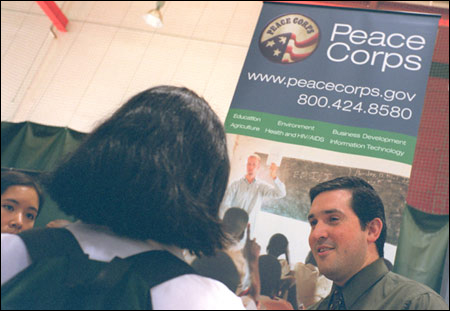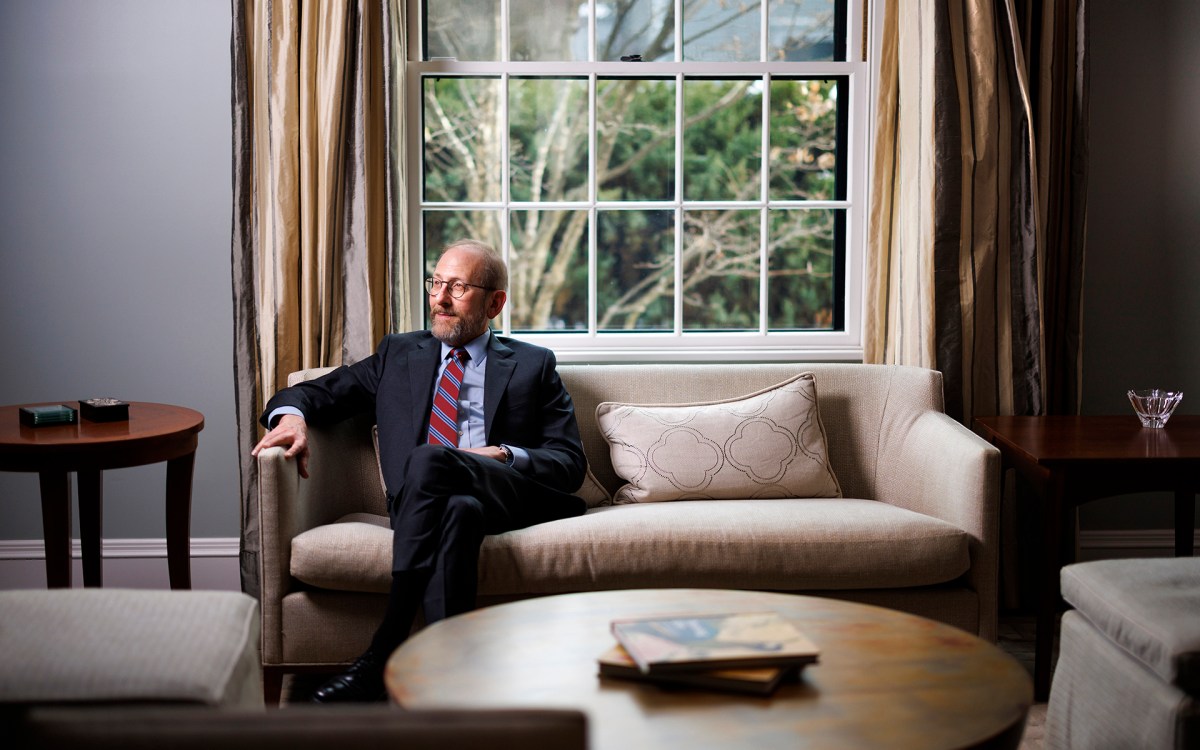Interest in public service careers jumps
Helping students negotiate the winding path to a public interest career

At the Office of Career Services’ (OCS) Career Forum last Friday (Oct. 10), Will Krause ’04 expressed pride and relief. He’d made his way halfway around the booths that lined Gordon Track without being lured away from his chosen career of government. “I’ve managed to avoid the consulting trap so far,” he said.
“But it’s hard. They’ve got great gifts,” he added with a smile, showing off a silver-plated mini-flashlight he picked up at the booth for Citadel Investment Group. In addition to the freebies, Krause came to the Career Forum – the finale of OCS’s Career Week – largely to browse. “I’ll probably end up volunteering for a campaign for a while and hopefully get a job,” he said, describing a career ladder some might see as nontraditional or even a bit wobbly.
Krause is hardly alone in his desire to stray from the well-worn path from Harvard into careers in investment banking, financial services, or consulting. The number of Harvard seniors planning or contemplating careers in public service leapt 45 percent between 2001 and 2003, according to Senior Surveys. President Lawrence H. Summers, himself a former public servant, has made clear his commitment to helping students pursue public interest careers. And while the search for nonprofit, government, or teaching positions may take more cunning and creativity than sliding into the “i-banking” on-campus recruiting schedule, Harvard boasts a variety of resources to help students explore how to make a difference while making a living.
Looking beyond ‘i-banking’
From house public service tutors to programs at Phillips Brooks House and the Institute of Politics to the counseling and resources at the Office of Career Services, students who wish to pursue public service as a career have plenty of places to turn. Yet many students are unclear about the range and nature of public service options – and that’s if they are aware of them at all.
“I’ve actually had people say, ‘If I work in a nonprofit, they pay me, right?’” says Gail Gilmore, an OCS counselor who makes public service one of her specialties. That’s extreme, she acknowledges, and the financial considerations of some students – those who have hefty student loans, for instance – are true barriers to pursuing public service.
Center for Public Interest Careers
Other organizations offering internships in public service careers:
The David Rockefeller Center for Latin American Studies
For many students, however, the financial hardships aren’t what they might imagine. “Sometimes it’s about educating them what a salary in a particular area of a nonprofit would be,” she says. Salary disparities between many entry-level positions in the for-profit and not-for-profit and government sectors are often much smaller than students think.
Sitting in a corner of Gordon Track as nearly 2,000 students ponder their futures, Gilmore discusses the seductive power of the “consulting trap” Krause had worked to avoid as he ran the gauntlet of booths. For very practical reasons, she explains, on-campus recruiting is dominated by the industries of banking, consulting, and financial services. These large companies have two-year training programs for college graduates, so they know each fall exactly how many spots they will need to fill. Because public service industries, as well as many for-profits, don’t hire this way, on-campus recruiting is not a cost-efficient tool for them.
“This causes students to think that there’s nothing for them at OCS unless they’re interested in consulting or investment banking,” Gilmore says. Further, students for whom such careers might not be a good fit may flock to them in anxiety. “They see their friends running around in business suits and going to interviews and on this very clearly defined path,” she says. “They know they should be doing something, but they don’t know what that ‘something’ is.”
One path to public interest careers
The Center for Public Interest Careers (CPIC), under the umbrella of Phillips Brooks House, was founded in 2001 to help would-be public servants define that ‘something.’ Corralling the forces of Harvard’s far-flung alumni network and various on-campus services, CPIC helps undergraduates explore careers in public service with internships, mentoring, and work-study positions.
Modeled after a similar program at Princeton University, CPIC connects Harvard undergraduates and graduating seniors with alumni mentors and nonprofit organizations for paid summer internships and postgraduate paid fellowships. The organization also oversees the Harvard/Radcliffe Clubs Summer Community Service Fellowship Program, coordinated with the Harvard Alumni Association (HAA) to offer summer public service internships in a student’s home city through local Harvard clubs. And with the student employment office, CPIC administers a grant program that pays work-study-eligible students for work in nonprofit organizations.
Not only does CPIC match bright, eager Harvard students with mission-driven organizations – from medicine to community organizing to legal aid to youth services – it can help students focus on career goals.
For “students who are questioning whether this is the sector they’d like to go into, it gives them some experience with the nonprofit sector, it allows them to begin to build a network,” says CPIC staff assistant Michael Bishop, who is overseeing CPIC this fall while coordinator Meg Brooks Swift is on leave. Recent research, he adds, indicates that students are more likely to pursue public interest careers if they’ve gained work experience in a nonprofit.
A CPIC summer internship with Chicago’s Center for Labor and Community Research had such an impact on Chris Catizone ’06. While public service was always a career goal, Catizone thought he was government-bound before he spent the summer working on labor and community organizing issues.
“It’s really changed my career thinking,” he says. “I’m really turned on to the work that community-based organizations do.” As an intern, Catizone completed an 80-page analysis on vocational education. But even more valuable, he says, is the time he spent assisting the executive director.
“Learning from him was the best part,” says Catizone, describing impassioned conversations the two had en route to meetings. “Watching his excitement, his vision, seeing that he was dedicating his life to making something work … that really got me thinking that that would be a good way to spend my life.”
A more proactive search
While CPIC and other internship programs help students explore public service careers and build all-important networks, they can’t erase what Gilmore calls a major obstacle for career-bound students.
“It requires a lot of effort on their part to do a job search,” she says. Pursuing meaningful work in education, government, or nonprofit organizations is “a much more proactive process” than stepping into an established training program offered by the banking, consulting, or financial services industries. Gilmore touts the services of OCS – from its extensive library to a passel of counselors who specialize in government, education, environment, public health, and international careers – as vital resources to help students negotiate a search they may perceive to be less traditional.
Gilmore darkens as she describes another largely unspoken barrier for some students who would otherwise pursue careers in the public interest. “There is a great deal of internal pressure … that says, ‘I went to Harvard, and I need to do something that is very prestigious where I will make a lot of money,’” she says. “The weight of the degree is sometimes an obstacle to pursuing work that is seen as being outside the general realm of what Harvard students do, what is expected by the world of a Harvard student.”
Still, public service careers are gaining traction among Harvard undergraduates. A Career Week panel on public service and government careers attracted more than 60 students. And employers from the public interest sector, which this year comprised 23 of the Career Forum’s 90 participants, have risen in the past five years, says Gilmore.
The view from their side of the booth seems rosier, too. James Arena-DeRosa ’78, New England Regional Director for the Peace Corps, attributes his organization’s rising success at Harvard to a top-down commitment to public service. “The Summers administration has been phenomenal,” he says.
“We’ve had a lot of extremely interesting and dynamic-seeming people stop by,” says Teach for America representative Avik Chatterjee ’02, juggling business cards and fielding questions from students who crowd his booth. Gilmore says that organizations like Teach for America and the Peace Corps, with clearly defined recruiting paths similar to those of corporate training programs, appeal to students who want to do public service but are overwhelmed by the legwork of finding such a job.
Chatterjee, however, sees a more altruistic motivation, one that presents a flip side to the students who may perceive a career in public service as unworthy of their Harvard degrees. “After being at Harvard for four years, people want to go out and do something positive about the problems they see,” he says.
Gilmore echoes the young teacher. “They really have a strong desire to take the problems that they care about and be part of the solution,” she says of the students she counsels. “They feel they’ve had privileges, and they want to give back.”




